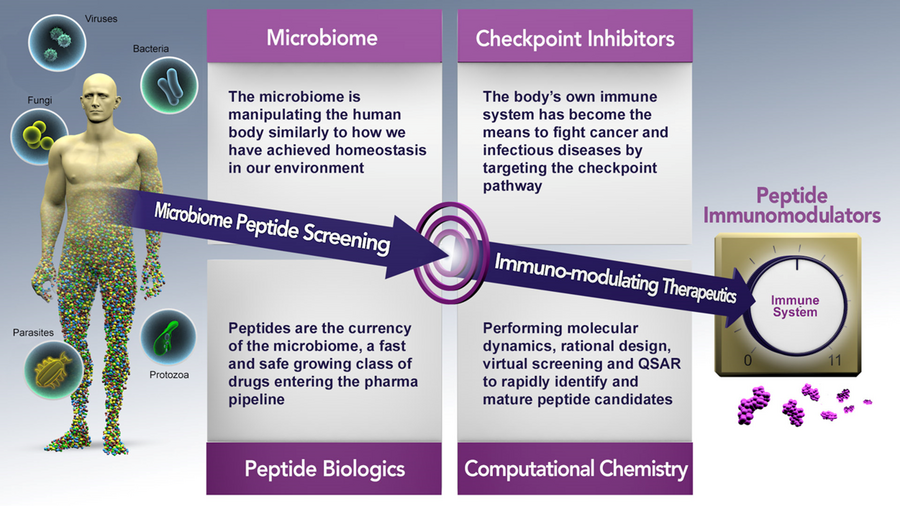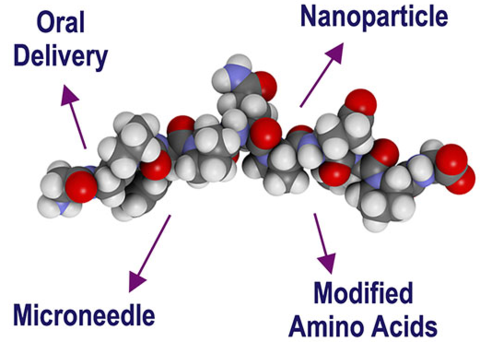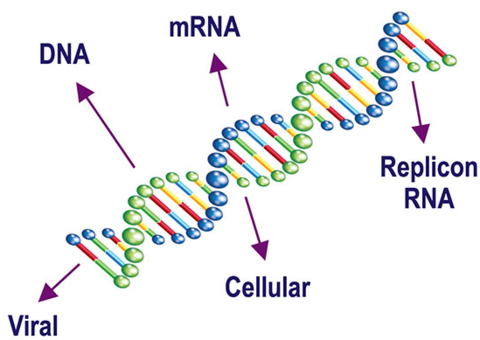
ExGloH
Explorations in Global Health
Applying immunotherapy for diseases more affordably and safely
Explorations in Global Health (ExGloH) is a dedicated division of Leidos Health developing methods that prove effective in not only treating cancer but for safe application in infectious disease vaccines.

ExGloH Overview
Technology
Building on our deep understanding of infectious disease vaccine development and cancer therapeutics from decades of product development support for our federal customers, we have created an effective platform for mining peptides, including the Microbiome for Novel Peptide Scaffolds, Microtide™. Currently, we have created an entirely new class of checkpoint inhibitors that prove effective, not only for treating cancer, but for safe application in infectious disease vaccines.
Monoclonal antibody inhibitors of the checkpoint receptors have proven powerful tools for treating cancer; however, safety issues and exorbitant costs have dampened enthusiasm for combining these modalities. Peptides afford the opportunity to improve safety over the mAb checkpoint inhibitor modality by allowing control over the duration of the drugs’ release in the body and the fine-tuning of the receptor binding site(s) to target the desired activity of the receptor function. Further, peptides can be flexibly incorporated into gene therapy platforms and other delivery modalities to allow control over the duration of drug release and provide flexible dosage regimens.
MicrotideTM
Microtide is a platform for discovering peptides that bind the checkpoint receptors by screening diverse libraries, including microbial-derived, and rapidly evolving the peptide scaffolds through computational chemistry. Indeed, our lead candidate has been designed to simultaneously antagonize two members of the CD28 checkpoint receptor family, PD1 and CTLA4.
Therapeutic modalities
Microtide™-discovered peptide candidates can be engineered in distinct modalities. By leveraging available biologics delivery modalities, our peptides provide the potential to fine-tune the dosage, location, and duration of release depending on their use as therapeutics or adjuvant, disease indication, and compatibility when used in combination with other drugs.
Stabilized Soluble Peptide
Synthetically manufactured peptides are both pure and cost-effective and can be stabilized for long-term storage (e.g., lyophilization). Due to our peptides’ small size (~20aa), they can also be delivered by various platforms at high concentrations. Their release durations can be manipulated by the engineered properties of the delivery platforms or by alterations to the peptides themselves.
Gene therapy engineering
Gene encoding of our peptides provides a tremendous amount of flexibility and governance over any intended target product profile. Nucleic acid format is also compatible with many delivery platforms, which allows modular co-delivery of therapeutic classes. Importantly, manufacture of DNA is relatively inexpensive, which is ideally suited for infectious disease vaccine concepts.
Focus Areas
Therapeutic Areas
Discovery and therapeutic targeting of the checkpoint receptors has revolutionized the fields of immunotherapy and, most dramatically, oncology. Pathogens also avoid immune detection by the inappropriate expression of checkpoint receptors on T-cells in patients with chronic infections (e.g., HIV, HBV, malaria); however, from a cost and safety profile, mAbs are not a feasible modality for use in infectious disease vaccine regimen. Therefore, we set out to create safe and cost-effective peptide-based immunomodulators. Additionally, CNS disease has also shown to be impacted by checkpoint mis-regulation, and peptides can be an effective tool for entering the brain and safely modulating immunologically relevant receptors.
MicrotideTM Peptide pipeline overview
Presentation abstracts
ExGloH engages academic and pharmaceutical partners by presenting current data at the top conferences in immunotherapy and infectious diseases. Click the links to download the abstracts.
Leadership
-
Jim Pannucci has over 20 years’ experience in early stage biopharmaceuticals development for global health, emerging infectious diseases, and biodefense. Prior to joining ExGloH Jim was the Director of the Partnership Development Office for the Frederick National Lab for Cancer Research.
-
As a research biologist, Gabe is focused on the design and development of therapeutics and vaccines against a broad range of disease indications. He has led the development of Leidos’ portfolio of microbiome-derived checkpoint inhibitors which has been successful in drawing parallels in the treatment of cancers and infectious disease.
-
Jessica Smith, Operations Manager
Tim Phares, Head of Immunology
Vin Kotraiah, Preclinical Discovery Lead













